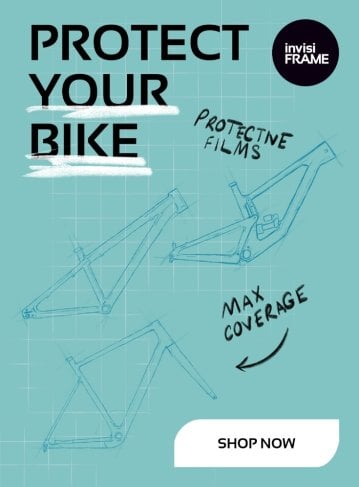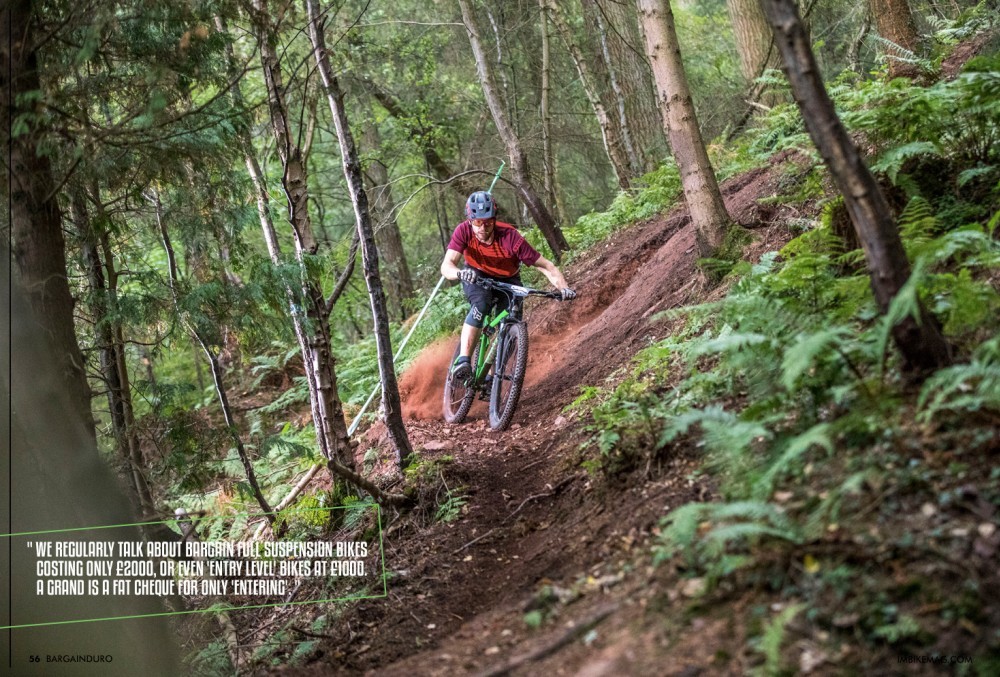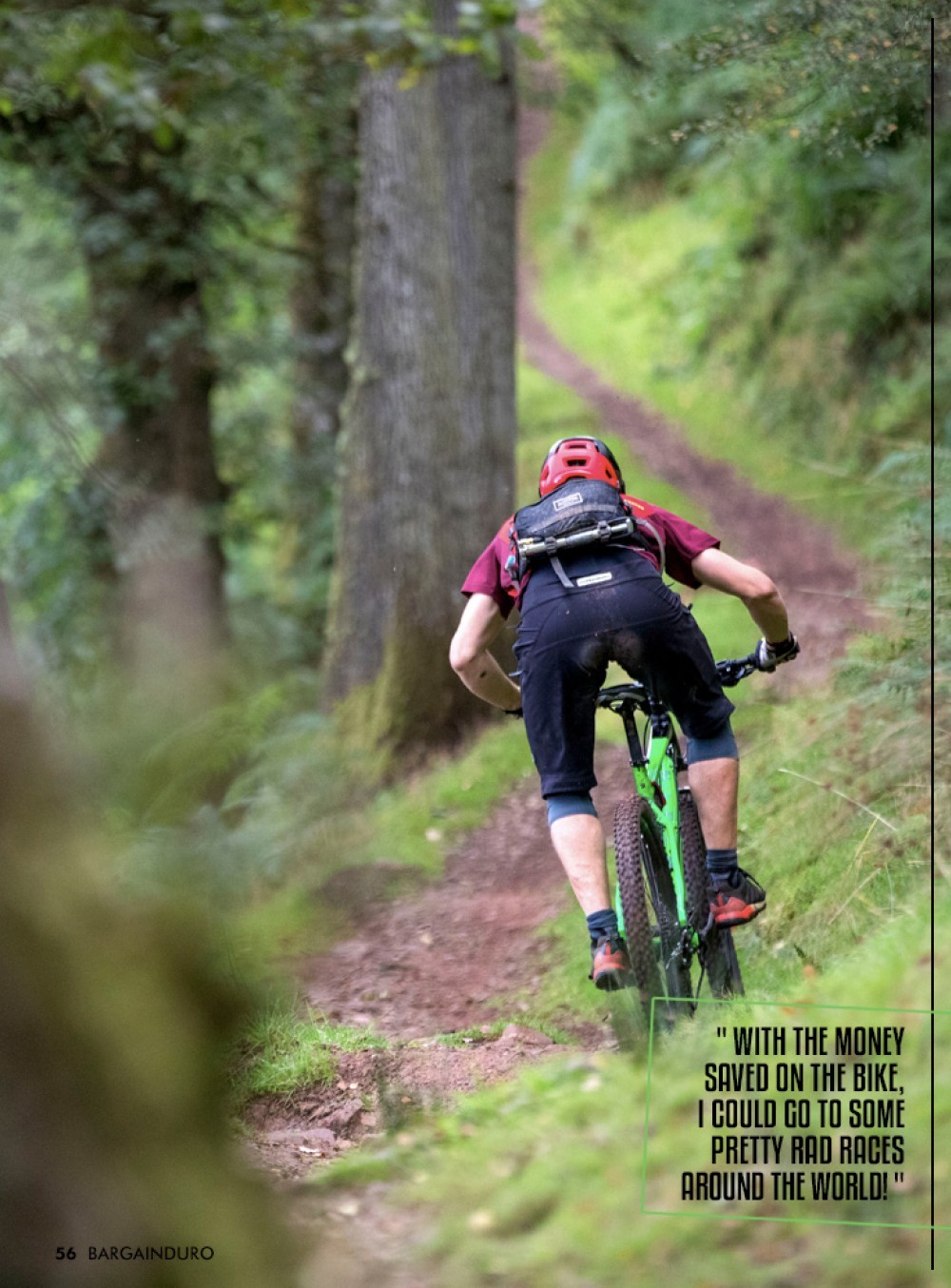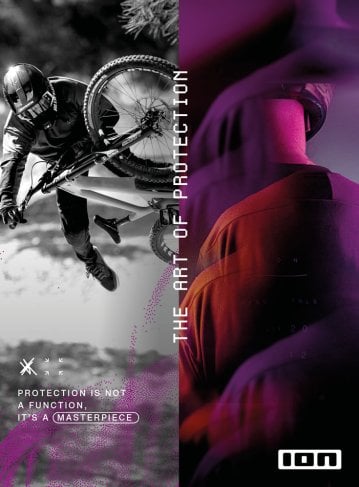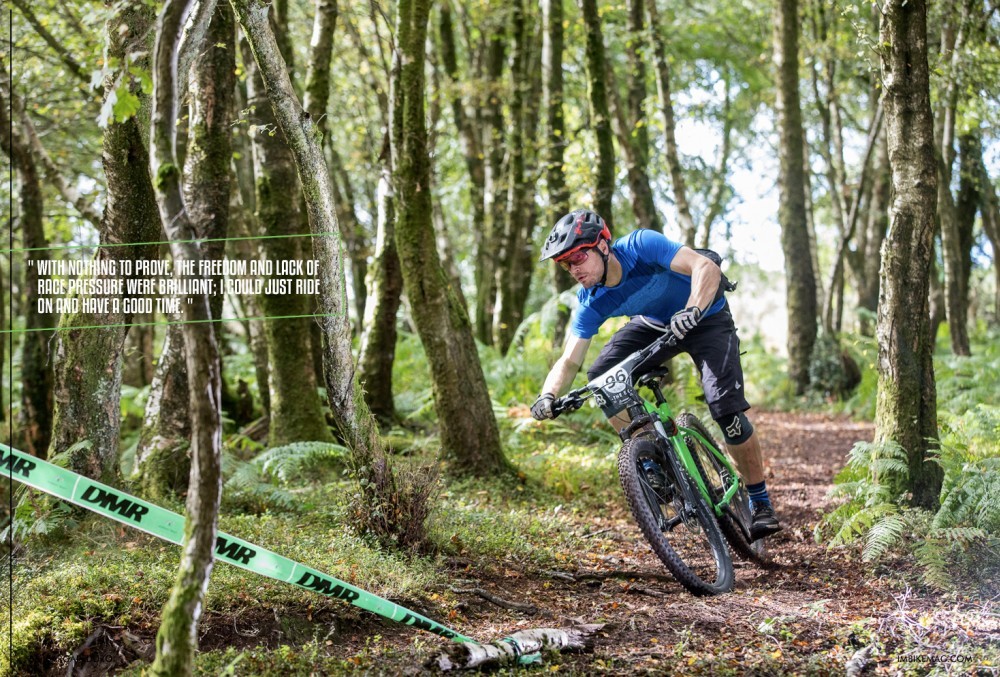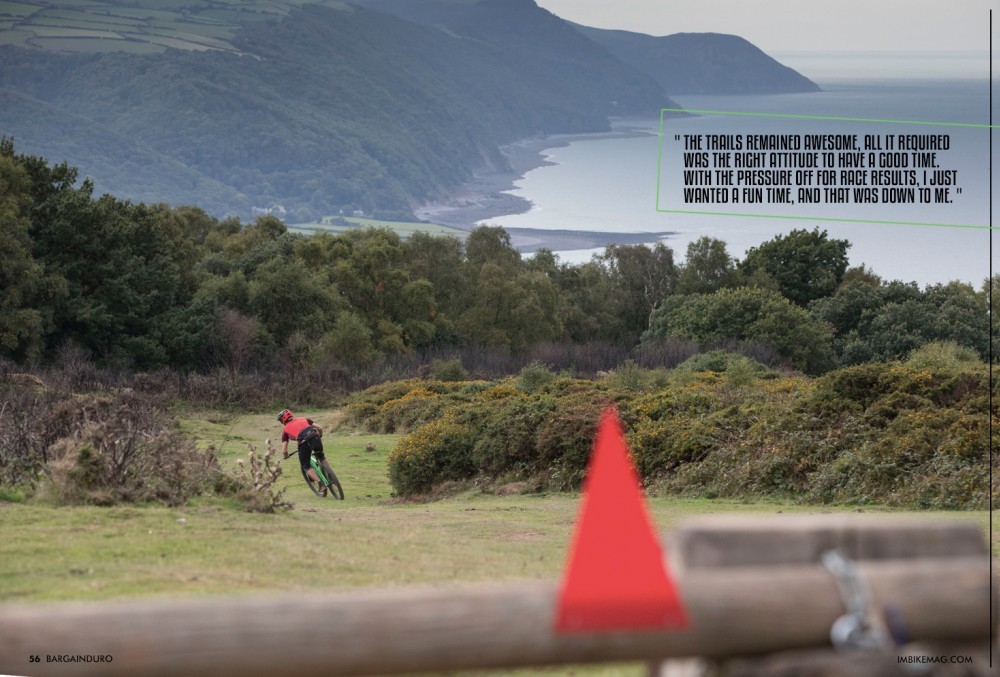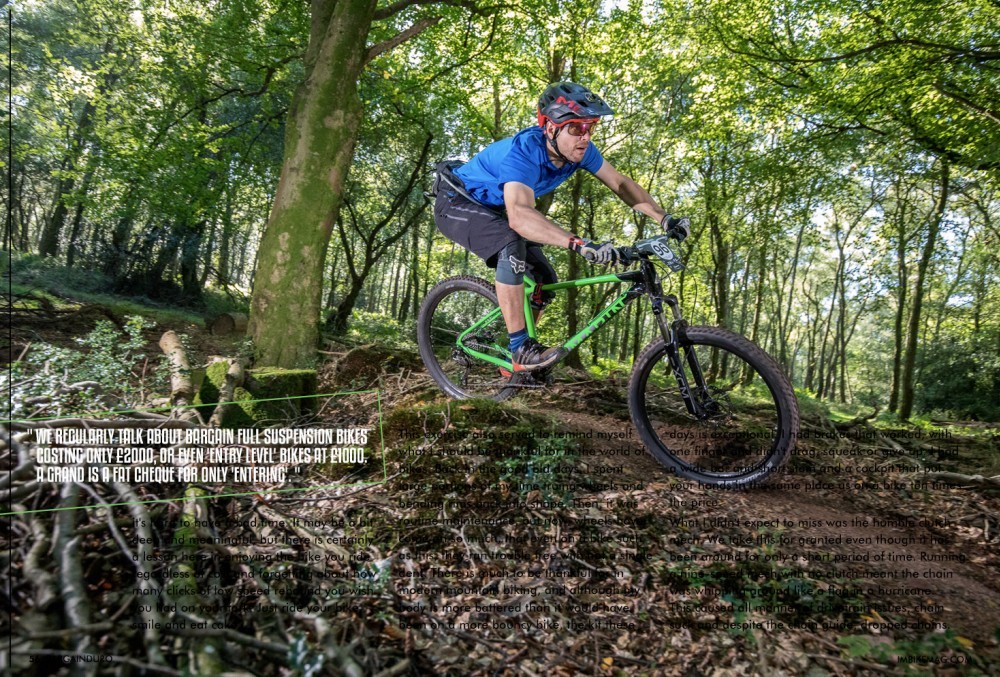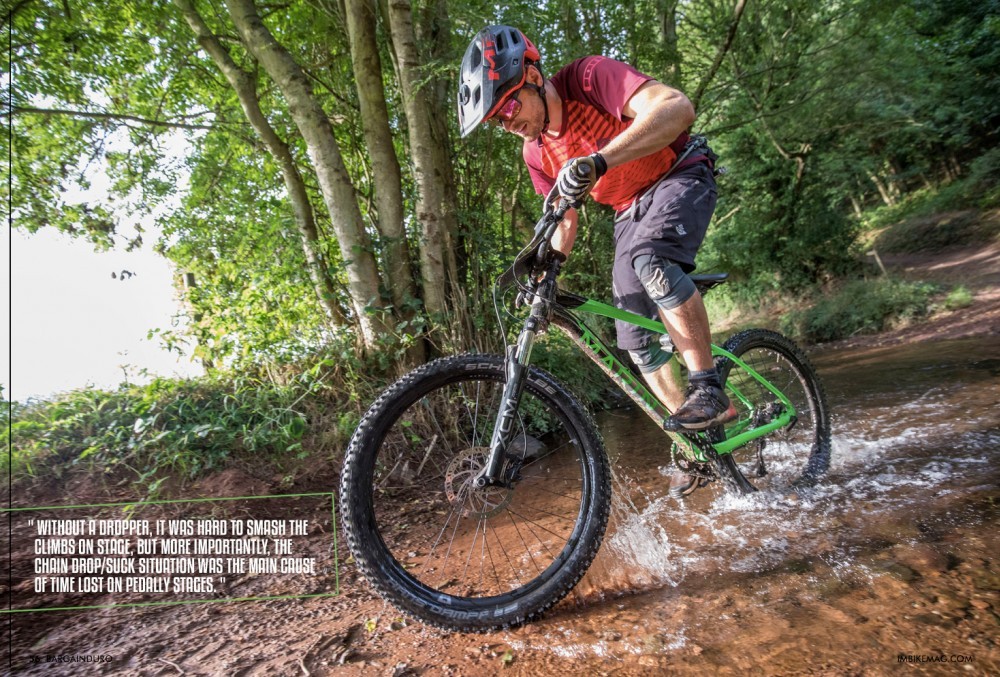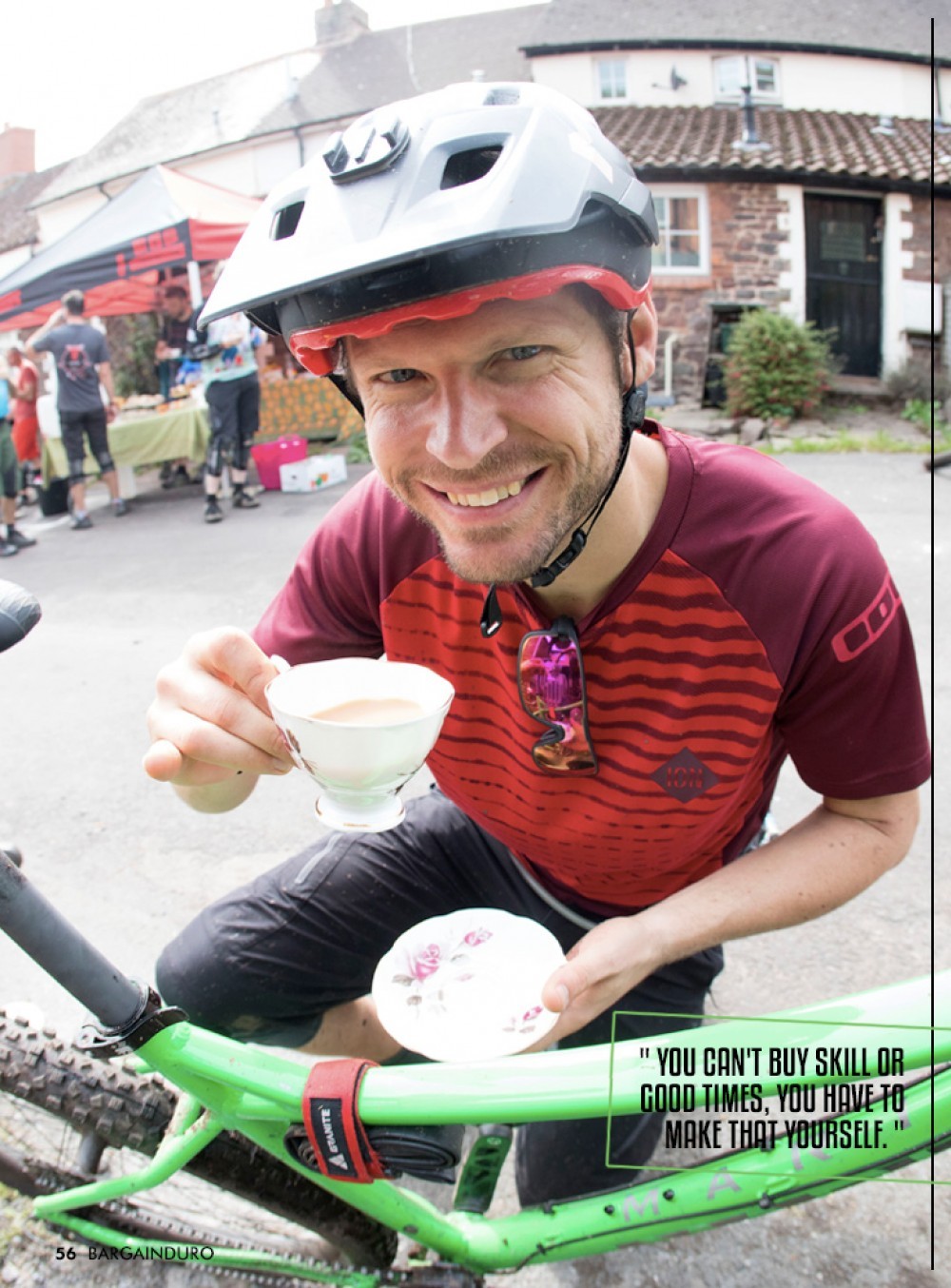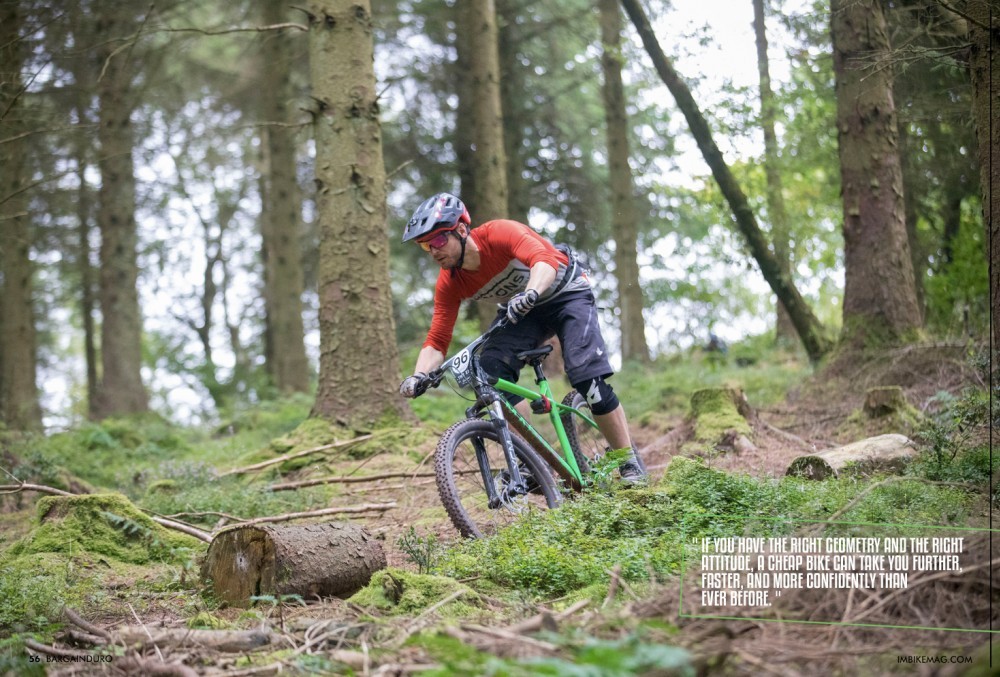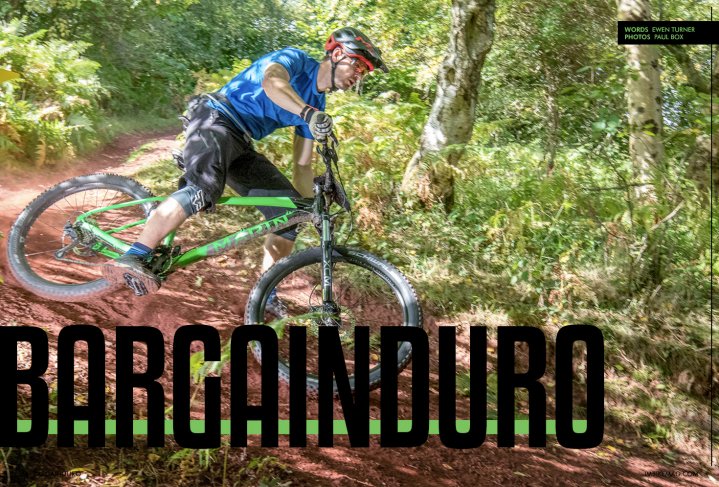
Bargainduro
Issue 56 / Fri 19th Oct, 2018
Ewen Turner takes a budget mountain bike and enters a three-day enduro race in Exmoor. Can a low-cost hardtail survive the beating? Find out how he got on and whether he was still smiling at the end of a gruelling but awesome multi-day stage race.
Ewen Turner turns modern mountain biking on it’s head and travels south to race the DMR Ex Enduro on a budget hardtail that cost him £650!
Barriers to participation in mountain biking are high. Its lack of accessibility is due to many factors including awareness, facilities and not least, money. Getting kitted up to ride mountain bikes is no frugal affair, with high prices for everything from helmets to footwear, before you have to factor in a bike! I'm fortunate to test some very nice kit, and I freely admit to becoming de-sensitised to the costs of bikes and forgetting what normal is. I felt it was time for a dose of reality, to get back to the roots of mountain biking and see how the sport looked from the ground floor, rather than the Kashima coated penthouse suite.
We regularly talk about bargain full suspension bikes costing only £2000, or even 'entry level' bikes at £1000. A grand is a fat cheque for only 'entering'. I'd been wanting to get involved with some budget bikes for a while, and the more I looked at them, the more I knew I needed to drop the price. From £1000 to £800, to finally settle on £650. This seemed to be the spot where a mountain bike actually looks like a mountain bike, not a 'bicycle shaped object'. I also needed to put my money (figuratively) where my mouth was, and not just test a bike for a couple of laps, but really get out there are live with a low-end bike.
Enter my experimental steed, Marin's new San Quentin, chosen by myself. I must add, this is no paid promotion, even this article is on a very tight budget. To add some excitement to the experiment, I was once again invited to my favourite enduro, the DMR EX Enduro. This is a three-day blind enduro in Exmoor and, keeping it in the budget theme, could well be described as a bargain version of the Trans Provence/BC/NZ etc. Multi-day stage racing is probably not what these bikes are designed for, but with the money saved on the bike, I could go to some pretty rad races around the world! The challenge was set, three days racing on a bike cheaper than the suspension forks on my 'other' bike!
Racing around the forests and hills of Exmoor would be an excellent if potentially ill-advised test. The stats speak for themselves, 121km over the three days with almost 4000m of ascent and descent. The trails vary from wide-open rocky boulder fests, through to smooth flowy woodland singletrack with gradients from mellow to near vertical. I predicted something would break, either the bike or myself.
Rocking up with a cheap bike turned out to be pretty liberating. No worries about what tyres to run, or suspension to tune in, it was ready to ride straight from the box. In the interests of full disclosure I did run tubeless, so a couple of valves and some sealant were required to get it up to speed. Without the need to fettle my bike endlessly, I could focus on the free beer on offer and get into the spirit of the event.
Interestingly, the bike didn't turn many heads. Maybe I'm just a bike geek and constantly check out everyone's ride, but I blended in pretty well, until someone asked what I was doing to my seat post. Turns out some riders have forgotten a world without dropper posts! With nothing to prove, the freedom and lack of race pressure were brilliant; I could just ride on and have a good time. The crucial question for me was whether I would have a good time and actually enjoy the riding, or simply suffer around the course.
The race is long, and over the three days, we received an uplift each morning before relying on our own efforts to grind around the rest of the course. With between six and eight stages per day, the race rewards consistency, raw speed and fitness. Racing mixed with awesome sea views and copious quantities of tea, cake and beer combine to make one of the best weekends of the year.
Once on the bike, we (the bike and I) had a period of adjustment. The lack of gear was certainly apparent, and at this price, fifty tooth cassettes do not exist, so old school nine speed would have to do. A thirty-two tooth chainring and a thirty-four rear cog were going to push my knees more than I would have liked, but we always used to manage in the good old days when we insisted on running one-by drivetrains with small cassettes.
On descents, the main issue was the suspension or lack of it. The trails remained awesome, all it required was the right attitude to have a good time. With the pressure off for race results, I just wanted a fun time, and that was down to me. A stiff frame with a less than supple fork made for a bone-shaking ride. Dropping into the loam filled corner riddled trails of Exmoor was great, but the rocky open trails less so. Get the bike on the right terrain and I felt barely disadvantaged, get it out of depth, and things got spicy pretty quick. Fortunately, with an event as enjoyable as the EX it’s hard not to have a good time and despite the odd sense of humour failure with the drivetrain, good times continued through the weekend.
Truthfully, I still had an awesome weekend of riding. Would I choose to race this bike every week? No. Rather than any one thing causing me grief, it was a war of attrition on my body. Back, shoulders and legs got a kicking on any descent, and by the end of the race, I was a bit broken.
Lessons learnt were many. Firstly, good events and good trails exist regardless of the bike you ride. If you can put race results aside and enjoy the riding, it's hard to have a bad time. It may be a bit deep and meaningful, but there is certainly a lesson here in enjoying the bike you ride regardless of cost and forgetting about how many clicks of low speed rebound you wish you had on your fork. Just ride your bike, smile and eat cake.
This exercise also served to remind myself what I should be thankful for in the world of bikes. Back in the good old days, I spent large portions of my time truing wheels and bending rims back into shape. Then, it was routine maintenance, but now, wheels have come on so much, that even on a bike such as this, they ran trouble free with not a single dent. There is much to be thankful for in modern mountain biking, and although my body is more battered than it would have been on a more bouncy bike, the kit these days is exceptional. I had brakes that worked, with one finger and didn't drag, squeak or give up. I had a wide bar and short stem and a cockpit that put your hands in the same place as on a bike ten times the price.
What I didn't expect to miss was the humble clutch mech. We take this for granted even though it has been around for only a short period of time. Running a nine-speed mech with no clutch meant the chain was whipping around like a flag in a hurricane. This caused all manner of drivetrain issues, chain suck and despite the chain guide, dropped chains. The good news was, despite bending the chain and the chainring, nine-speed kit bends back nicely with the application of a trailside rock! I doubt Eagle responds so well to such Neolithic maintenance regimes.
I'm not one for over sharing my results, no matter how mediocre, but for this test I was interested. 2017 I finished in 18th place, this year I finished 47th. Fortunately, the always rapid Jono Jones won last year and this year, which makes for some analysis. In 2017 I was 15% slower than Jono, and in 2018 I was 27% slower, both on hardtails, but the Pipedream frame from last year costs the same as this entire bike. It's a chunk of time, but can probably be explained by a few crucial parts of the bike.
Firstly without a dropper, it was hard to smash the climbs on stage, but more importantly, the chain drop/suck situation was the main cause of time lost on pedally stages. The agricultural fork, didn't take much of the sting out of the trail, but overall the bike was fundamentally good, and not a world away from any other mountain bike. If I could have put the power down more easily I'd have been faster, and a better fork would be comfortable, but that's all. I do reckon, however, that Jono Jones would win on a tricycle, so maybe the analysis is pointless.
After the race and back on a much more expensive bike, it didn't feel as 'night and day' as one would expect. A full suspension rig soothed my battered body, and the more numerous gears allowed for height to be more easily won. As riders, we are pretty spoilt with performance, and a bike may cost significantly more, but you can't buy skill or good times, you have to make that yourself. I'm happy to be back on my posh bikes, but with a little more appreciation for the finer things in mountain biking.
Those out there looking for a budget bike, it is all about the angles, always the angles. The only way I survived the race was due to a slack head angle and a long-ish reach. Without this set up I would have been a jibbering wreck for the whole weekend. Many entry-level bikes are essentially based on XC geometry with long stems and steep head angles. Experienced riders who like descending have been demanding shorter stems, wider bars, longer reach and slacker angles for years.
This is because it gives the rider more confidence. Why then, should we not give all this confidence inspiring geometry and knowledge to new riders who probably need it more than anyone? If you have the right geometry and the right attitude, a cheap bike can take you further, faster, and more confidently than ever before. The top end may be getting ridiculously expensive, but it's the bottom end, which is exciting for me, it'll only be a few years, and clutch mechs will be standard at this point, and an air fork can't be far off. The future of mountain biking is here, affordable bikes to put smiles on faces and more people on the trails.
Thanks to The Ex Enduro, DMR and Marin for representing all that is good about mountain biking! If only the race times were divided by the cost of the bike, I could have been stood on the podium!
Videos
By Ewen Turner
Ewen Turner is a self-confessed bike geek from Kendal in the Lake District of England. He runs a coaching and guiding business up there and has a plethora of knowledge about bikes with an analytical approach to testing. His passion for bicycles is infectious, and he’s a ripper on the trails who prefers to fit his working life around his time on the bike.



